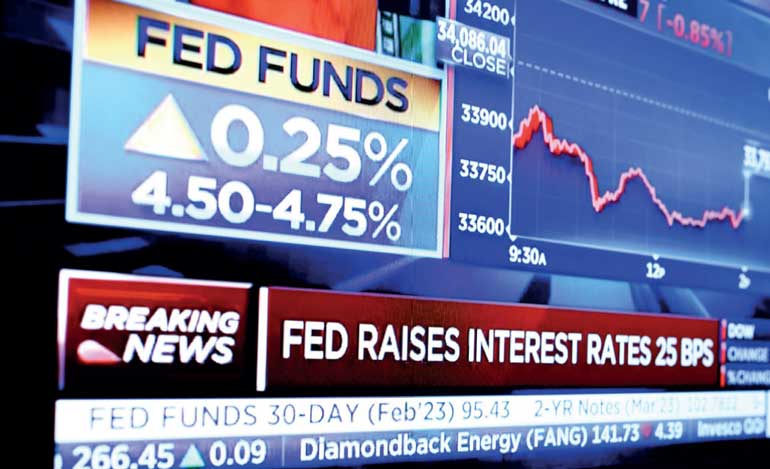Wednesday Feb 18, 2026
Wednesday Feb 18, 2026
Wednesday, 15 March 2023 00:02 - - {{hitsCtrl.values.hits}}

The Fed rate announcement is seen on the floor of the New York Stock Exchange (NYSE) in New York City, US, 1 Feb – [Photo/Agencies]
 Inflation rates are soaring across the world, with food and energy prices hitting record highs. Countries around the world continue to be under immense pressure from the rising cost of living, including food and energy prices, due to Western sanctions on Russia, rising household demand for goods, and the disruption in global supply chains because of the COVID-19 pandemic and the Russia-Ukraine conflict.
Inflation rates are soaring across the world, with food and energy prices hitting record highs. Countries around the world continue to be under immense pressure from the rising cost of living, including food and energy prices, due to Western sanctions on Russia, rising household demand for goods, and the disruption in global supply chains because of the COVID-19 pandemic and the Russia-Ukraine conflict.
Yet in 2022 alone, the US Federal Reserve raised its key interest rate seven times to arrest the rising consumer goods prices in the United States and control inflation — an effort that it succeeded to a large extent.
However, the Federal Reserve decided to raise the interest rate again on 1 February to control rising inflation in the world’s largest economy.
The Fed’s aggressive tightening policy has made the US dollar a much stronger currency. The Fed policy rate is now set within a range of 4.5% to 4.75%, up from near zero a year ago. With the US dollar continuously gaining in strength, currencies around the world have been weakening, pushing up the prices of imported goods, including food, fuel and medicine, and exporting inflation to other countries.
A stronger dollar has increased other countries’ borrowing costs and decreased the value of other currencies, putting more pressure on central banks to raise their respective interest rates, which incidentally will raise consumers’ borrowing costs for home mortgages, car loans and other items at a time when inflation is still very high.
Many developing countries with big debts have been particularly hard hit by the strengthening US dollar because their external debt stocks and debt service payments are mostly denominated in dollars, making it even harder for them to borrow in the open market to finance their budget deficits.
The higher the interest rate in the US, the more global investments the country will attract. This could greatly reduce the inflow of foreign direct investment in other emerging markets. This year alone, US interest rate hikes could deprive developing economies of $ 360 billion of future income, according to a UN report.
No wonder a UN agency called the Fed’s actions an “imprudent gamble” with the lives of those less fortunate. If central banks don’t “course correct”, the UN agency said, emerging economies could tumble into a series of debt crises and health and climate emergencies.
In contrast, on its way to achieving the peaceful modernization, China has proposed the Global Development Initiative to help build a global community of development. The GDI puts development at the centre of the international agenda, and is aimed at forging a united, equal, balanced and inclusive global development partnerships in order to accelerate the implementation of the 2030 Agenda for Sustainable Development Goals.
As another important global initiative put forward by China after the Belt and Road Initiative, the GDI has received the support of more than 100 countries and many international organizations, including the United Nations, with over 60 countries having joined the “Group of Friends of the GDI”. The “Group of Friends” has become an important force boosting coordination and solidarity among countries to pursue development, and an effective platform for countries to discuss with the UN development agencies how best to implement the 2030 Agenda.
Every country has the right to development and every country wants to pursue development. And no country or individual should be left behind on the path of development. This is the aspiration of the GDI and the goal advocated by the UN. China has also proposed the Global Security Initiative with the aim of promoting peace and development, and safeguarding national security in a fast-changing world. The GSI is expected to meet the pressing need of the international community to maintain global peace and prevent confrontations and wars, fulfil the common aspirations of all countries, uphold multilateralism and international solidarity, and work together to overcome difficulties and build a better world.
People worldwide are keen on developing a peaceful and stable environment that would help countries to focus on economic growth, job creation, improving people’s livelihoods, and working together to address global challenges.
While remaining committed to its own development, China is urging all countries to collectively build a more peaceful, secure and prosperous global community with a shared future for mankind and contribute to the development of the world economy.
However, the United States, having assumed the role of the world’s policeman and claiming to shoulder the moral responsibility of upholding freedom and democracy, is weaponising the dollar to maintain its global economic and geopolitical position and using economic sanctions as a tool to target countries which do not toe its line or appear to threaten its interests.
(The writer is Director of Belt and Road Initiative Sri Lanka, an independent and pioneering Sri Lanka-led think tank.)
(Source: https://www.chinadaily.com.cn/a/202302/27/WS63fbf373a31057c47ebb0ee0.html)